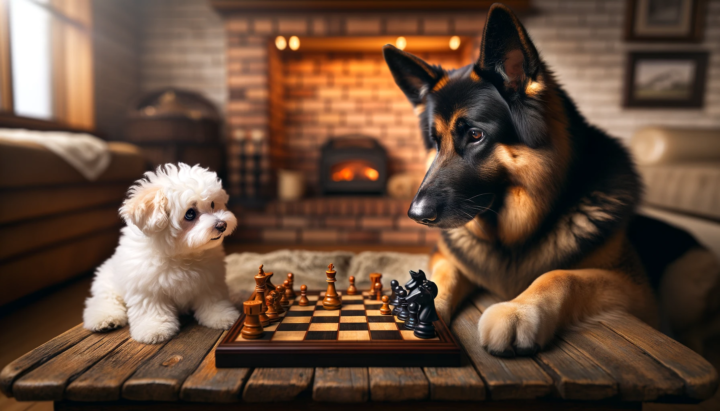When you’re a working woman with a busy schedule, living in an apartment, and raising a small pup, you might wonder, “Are small dogs as smart as big dogs?” This question is more than just a curiosity—it’s key to understanding how your furry friend learns and adapts to your lifestyle.
Intelligence in dogs is fascinating. It’s not just about obeying commands; it’s about how they interact with us and their environment.
Smart dogs can make training a breeze, saving precious time for busy pet parents. They’re quick at picking up tricks and cues, which is a big plus in a fast-paced life.
It’s crucial to know that dog intelligence isn’t just one-size-fits-all. It includes memory, social intelligence, and problem-solving skills. Studies have shown that all dogs have social intelligence skills.
So, are small dogs as smart as big dogs? The answer might surprise you.
Keep reading to discover 5 surprising facts that will help you understand the smarts of your small pup and how you can nurture their intelligence to fit into your life perfectly.
Table of Contents
Key Takeaway
- Size doesn’t define dog intelligence.
- Both small and large dogs have unique strengths.
- Training should play to a dog’s natural abilities.
- Intelligence is multifaceted in canines.
The Scale of Intelligence

When we explore the query “Are small dogs as smart as big dogs?”, the size of a dog’s brain often jumps to the forefront of our discussion.
The common belief links a bigger brain to greater intelligence, leading to theories about each breed’s ability to perform tasks.
Brain Size and Intelligence: What’s the Link?
It’s a myth that’s been barking around for ages: bigger dogs with bigger brains must be smarter, right?
But the University of Arizona study tells a different tale, suggesting that while larger dogs may have better short-term memory and self-control, intelligence is not just a one-trick pony.
It’s a complex mix of abilities, from understanding commands to problem-solving.
Smart Training Techniques
Knowing this, how can busy dog parents use this information? It’s all about tailoring your approach.
For working women with small pups, this might mean less repetition in training due to their petite pals’ quick-witted nature.
Maximizing Your Pup’s Potential
With the right strategies, both small and large dogs can thrive under the guidance of a savvy owner. As we unfold the layers of doggy intelligence, you’ll discover how to harness your dog’s natural talents to fit into your active lifestyle.
Continue with us as we fetch more insights on how to make the most of your dog’s smarts—whether they’re pint-sized pooches or gentle giants.
Task Mastery in Small and Large Breeds

Diving into the debate of “Are small dogs as smart as big dogs?”, it’s essential to look at how each breed masters tasks.
The kind of tasks dogs excel at can tell us a lot about their intelligence and how it can be harnessed effectively, especially for apartment dwellers with limited time.
Task-Specific Talents of Large Dogs
- Search and Rescue: Their size and memory help them remember complex commands and search patterns.
- Guard Duty: Bigger breeds are great at remembering regular visitors versus strangers, making them natural guards.
- Obedience Competitions: Their ability to remember sequences of commands is a big win for larger breeds.
Large dogs often have a majestic presence that goes hand-in-hand with their task-specific talents.
Their size and better short-term memory can give them an advantage in certain types of training and tasks.
Where Small Dogs Shine
- Agility Courses: Their size makes them natural at weaving through obstacles quickly.
- Learning Tricks: Small dogs often need fewer repetitions to learn new tricks, saving time for busy owners.
- Therapy Work: They excel in social intelligence, making them great companions in therapeutic settings.
Small dogs have a knack for tasks that require quick thinking and adaptability. They can be surprisingly quick learners and are often eager to please, which can be a significant benefit for the time-constrained schedules of working women.
Each size has its champions, and knowing this can make living with and training your canine companion a joy rather than a chore.
Let’s continue to explore how we can leverage these talents for happy and healthy living with our furry friends, no matter their size.
Cognitive Skills: Small Dogs and Large Dogs

When tackling the topic “Are small dogs as smart as big dogs?”, it’s intriguing to compare how each size manages cognitive challenges.
Research indicates that while larger dogs might have the upper hand in memory and self-control, small dogs often outpace them with their social intelligence.
This includes an impressive knack for understanding human cues and commands, which can be incredibly helpful for training purposes.
Equal Ground – Tasks Both Excel In
Despite their size differences, both small and large dogs can be equally adept at certain tasks. For instance, both can excel at:
- Understanding Human Cues: They’re both sharp at picking up on gestures or tone of voice.
- Learning Commands: With patience and practice, they can learn a variety of commands to the same extent.
- Emotional Support: They sense and respond to human emotions with similar empathy.
- Scent Work: Dogs of all sizes have keen noses, making them equally good at scent-based tasks.
- Routine Following: They can learn and adapt to daily routines, regardless of their size.
It’s clear that intelligence is not just a matter of size. Whether you have a cozy studio or a spacious loft, recognizing and harnessing your dog’s cognitive skills can make living with your furry friend a joy, no matter their size.
Intelligence at Home – Large vs. Small Breeds
In the cozy corners of apartment living, the intelligence of small dogs often shines through.
Small breeds tend to navigate the limited space with ease, displaying their problem-solving skills when finding the comfiest spot or figuring out how to get their favorite toy from under the couch.
Their social intelligence makes them adept at reading their owner’s moods and behaviors, allowing them to be supportive companions during bustling daily routines.
Training Strategies for Smart Living
For smart living with your pup, consider training strategies that play to your dog’s strengths.
Small dogs, with their quick learning and adaptability, can benefit from short, playful training sessions that involve puzzle toys or hide-and-seek games that cater to their problem-solving tendencies.
Large breeds, with their good memory, might excel in more structured activities that involve a series of commands or tasks.
By tailoring your training approach to fit your dog’s natural inclinations, you ensure a happy, well-adjusted pet who feels right at home, no matter the size of your living space. Stay tuned for more tips on enhancing your dog’s intelligence as a seamless part of your daily life.
Enhancing Your Dog’s Innate Abilities
Exploring the question “Are small dogs as smart as big dogs?” opens up avenues to enhance the innate abilities of our canine companions, tailoring activities to their size and intelligence.
Nurturing Natural Skills
Engaging activities can stimulate a dog’s intellect and provide exercise, which is vital for their well-being:
- Puzzle Toys: Both small and large breeds benefit from the mental challenge, leading to improved problem-solving.
- Fetch Variations: Introducing rules or commands can turn a simple game into a learning opportunity.
- Agility Training: For small dogs, it hones their quickness; for large dogs, it builds coordination.
Overcoming Size Stereotypes
Celebrating dogs who defy the norms inspires owners to expect more from their pets:
- Small Dogs in Service: Many small breeds are now trained as service dogs, roles typically reserved for larger breeds.
- Large Dogs in Lapdog Roles: Despite their size, many large breeds excel in roles needing gentleness, such as therapy dogs.
Understanding and nurturing each breed’s strengths lead to happier, more intelligent, and well-adjusted pets that fit seamlessly into the lives of their busy owners.
Final Words
In essence, both small and large dogs showcase intelligence that defies size—they are equally smart in their own unique ways.
This journey through canine cognition underscores the importance of recognizing and nurturing the individual abilities of our dogs. Intelligence in our furry friends is multifaceted; both small and large breeds possess a spectrum of skills and talents.
As dog owners, celebrating these capabilities ensures that each dog, regardless of size, can live a fulfilling and enriched life alongside their human companions.
Resources
- https://www.aaha.org/publications/newstat/articles/2017-03/dogs-and-people-share-social-intelligence-skills/#:~:text=The%20study%20tested%20552%20dogs%2C,looking%20at%20the%20hiding%20places
- https://news.arizona.edu/story/do-bigger-brains-equal-smarter-dogs-new-study-offers-answers
- https://www.psychologytoday.org/
